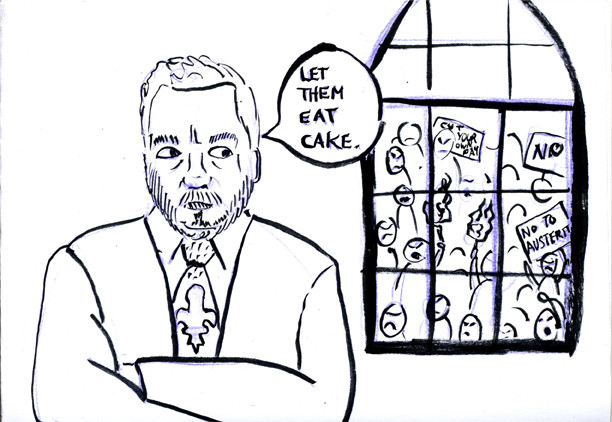Austerity: Not an Obligation, Not a Necessity
Since the announcement of cuts to Quebec’s education budget, the necessity of austerity has become a matter of public debate. We were prompted to write this piece after being repeatedly asked, “What is austerity?”
Austerity, or to use the provincial government’s rhetoric, “financial consolidation,” is an economic process that aims to reduce national debt by decreasing government expenditures. In practice it usually means reducing the number of civil servants and cutting funds allocated to “superfluous” or “non-vital” sectors like healthcare and education, as we have seen this year in Quebec.
Interestingly, on a federal level, military spending often goes untouched—the destruction of one ISIS vehicle, say a pickup truck, is estimated at $500,000.
By implementing austerity measures, Premier Philippe Couillard is attempting to curb Quebec’s deficit spending. His administration anticipates Quebec will accumulate $2.35 billion in debt through 2014-15, primarily due to the province’s aging population. The Liberal Party of Quebec will defund public services to counter slowed economic growth.
Couillard’s administration has decided, rather inflexibly, that the deficit must be eliminated by 2015-2016. In the words of current finance minister Carlos Leitão, “[a balanced budget] is not an obsession. It is an obligation.”
Austerity’s theoretical basis rests on two recent academic works. The first—Carmen Reinhart and Kenneth Rogoff’s Growth in a Time of Debt —attempted to prove that when a government’s debt exceeds 90 per cent of its GDP the economy collapses. The second—Alberto F. Alesina and Silvia Ardagna’s Large Changes in Fiscal Policy: Taxes Versus Spending—argued that when the government of an advanced country (like Canada) slashes expenditures, the economy will expand rather than contract due to increased confidence in the private sector.
These two theories have since been disproven, the first due to mathematical errors and the second because, according to the International Monetary Fund, its data did not establish a link between economic growth and austerity measures.
Paul Krugman, a professor of economics and international affairs at Princeton University and recipient of the Nobel Prize in Economics in 2008 argues that “slashing government spending reduces overall demand, which leads in turn to reduced output and employment.” Consequently, “all the austerity we’ve seen is very premature […] it should wait until the economy is stronger.”
Even the IMF, once the main proponent of austerity policies, changed its position in 2012 as the economic growth of Greece, Spain, Portugal and Ireland plummeted in proportion to the degree of austerity implemented.
Quebec currently enjoys the lowest rate of social inequality in North America, mainly thanks to its social programs. Philippe Couillard, however, has declared that Quebecers “don’t need to have in Quebec the most luxurious programs in Canada,” and Finance Minister Carlos Leitão insists “[we] need to question the relevance of all our social programs.”
Concerning this year’s financial cuts, Leitão has stated “the budget of 2014–2015 is firmly focused on spurring Quebec’s economic recovery and restoring sound public finances […] Every necessary effort will be made to create wealth and jobs and ensure Quebecers reap the benefits of an enviable social model.” But, as we have seen, austerity measures are both detrimental to economic growth and not conducive to the maintenance of any sort of “enviable social model.”
Trying to reduce the provincial debt is a laudable and responsible enterprise; however, attempting to balance the budget within the year is as reckless as it is unnecessary. It’s a fallacy that universities will be able to maintain the same quality of service with diminished funding. It’s a fallacy that Quebecers will enjoy the same standard of living under diminished public services. And, finally, it’s a fallacy that the only alternative to austerity is a burdensome increase in taxes. When the welfare state was first created, most of the government’s income came from the business sector, a load that has shifted to private citizens since the 1980s.
Although there is copious evidence to the contrary, accumulation of public debt is often misattributed to public services alone. An attack on public services is an attack on the welfare of the population, and despite his assurances to the contrary, Couillard’s economic policies are well within this destructive framework. Austerity is not a simple polemical political issue; it is not a matter of left versus right. It doesn’t have a compelling theoretical or historical basis.
Austerity is not a necessity; it is a choice—a choice that is not in our interest.




_600_375_90_s_c1.jpg)

4_600_375_90_s_c1.jpg)